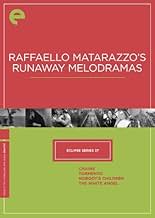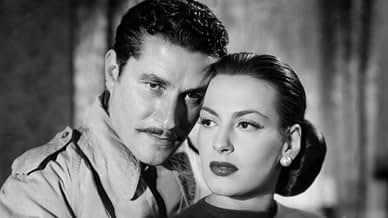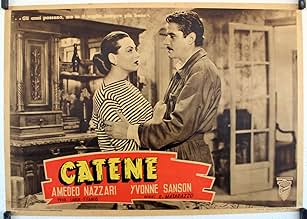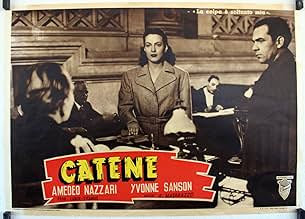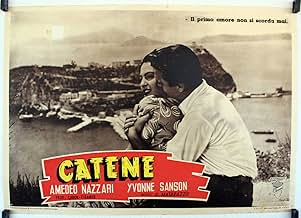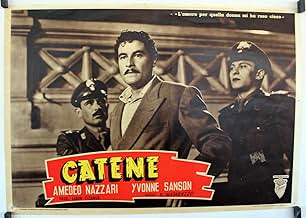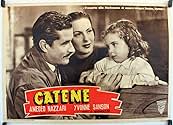Füge eine Handlung in deiner Sprache hinzuFirst in a series of Matarazzo melodramas: A happily married Naples woman, with two children, is threatened by the reappearance of a man from her past. Her husband takes a drastic action whi... Alles lesenFirst in a series of Matarazzo melodramas: A happily married Naples woman, with two children, is threatened by the reappearance of a man from her past. Her husband takes a drastic action which results in the family members being separated.First in a series of Matarazzo melodramas: A happily married Naples woman, with two children, is threatened by the reappearance of a man from her past. Her husband takes a drastic action which results in the family members being separated.
Nino Marchesini
- L'avvocato dell'accusa
- (Nicht genannt)
Empfohlene Bewertungen
(1949) Chains/ Catene
(In Italian with English subtitles)
DRAMA
It opens with someone driving a car away as far and long as possible until it stops working anymore. He then takes it to the private garage belonging to Guglielmo Aniello (Amedeo Nazzari) with his young son, Tonino Aniello (Gianfranco Magalotti). And it is not long before Guglielmo's wife, Rosa Carrisi (Yvonne Sanson) shows up with their younger daughter, Anna Aniello (Teresa Franchini), sharing the same apartment complex with Guglielmo's biological mother, Angela Aniello (Rosalia Randazzo) or what Rosa calls her Granny. Guglielmo then informs the driver that car will not be available until the following day as it needed a specific part and that it would not be available until the next day. Meanwhile, the driver then sees sleazeball, Emilio (Aldo Nicodemi) and he convinces him to pull the car out as soon as possible. And while Rosa's husband is out running errands in the middle of the night, it was during them the driver returns who manages to convince her to open the garage door so that he can take the car out. It was during then Emilio finally sees Rosa's face and as it turns out both used to know one another to which they used to be a couple. She tries to tell him she is happy with the family she has, Emilio would not take no for an answer. For the next hour or so, he goes on a pursuing rant attempting to rekindle the relationship they used to have with each other except that his past is shady. Will Rosa leave her family behind to be with sleazeball and criminal Emilio with unfortunate circumstances happen leaving with a superficial ending.
Anyways, I saw a similar synopsis before with the difference between the two movies is the last half hour is different released 1943 called "The Children Are Watching Us". This film despite the happier ending is a little outdated and old school.
It opens with someone driving a car away as far and long as possible until it stops working anymore. He then takes it to the private garage belonging to Guglielmo Aniello (Amedeo Nazzari) with his young son, Tonino Aniello (Gianfranco Magalotti). And it is not long before Guglielmo's wife, Rosa Carrisi (Yvonne Sanson) shows up with their younger daughter, Anna Aniello (Teresa Franchini), sharing the same apartment complex with Guglielmo's biological mother, Angela Aniello (Rosalia Randazzo) or what Rosa calls her Granny. Guglielmo then informs the driver that car will not be available until the following day as it needed a specific part and that it would not be available until the next day. Meanwhile, the driver then sees sleazeball, Emilio (Aldo Nicodemi) and he convinces him to pull the car out as soon as possible. And while Rosa's husband is out running errands in the middle of the night, it was during them the driver returns who manages to convince her to open the garage door so that he can take the car out. It was during then Emilio finally sees Rosa's face and as it turns out both used to know one another to which they used to be a couple. She tries to tell him she is happy with the family she has, Emilio would not take no for an answer. For the next hour or so, he goes on a pursuing rant attempting to rekindle the relationship they used to have with each other except that his past is shady. Will Rosa leave her family behind to be with sleazeball and criminal Emilio with unfortunate circumstances happen leaving with a superficial ending.
Anyways, I saw a similar synopsis before with the difference between the two movies is the last half hour is different released 1943 called "The Children Are Watching Us". This film despite the happier ending is a little outdated and old school.
"Catene" is the European melodrama ,very different from the American one ;in the Italian (or French) works,the woman does not make up for her love grief with business success:she knows her place and all she has in mind is to win her husband's love again and save her family ;one should point out that ,in "Catene" the children do not overplay,as it is often the case in the genre ,but shows sensitiveness and true pain (you can read the whole tragedy in the little boy's dark eyes).It has also a reactionary side (but it is the name of the game in melodrama): a woman shall not cheat on her husband (and the the other way about?),principally if he is a shady person with a mysterious (and dishonest) past .
Although the ending is predictable ,the two leads' conviction stretches the meaning of their words.
Although the ending is predictable ,the two leads' conviction stretches the meaning of their words.
It was probably the first film I saw when I was 7 years old. And I never seen it until I succeed to get it by the italian embassy in Paris and an italian bookshop, which ordered it for me in Italia. I don't understand italian, but I was so happy to see this film!!! I don't understand why the films of Matarazzo are now completely ignored, in France at least. The mark of this film was so deep that I was able to tell sometimes what will be the next action in the play. It was a great moment for me!!
10ricbigi
I am new to Raffaello Matarazzo's work. I have only seen three of his films (CATENE, I FIGLI DI NESSUNO e CHI È SENZA PECCATO). They have made a strong impression on me. The stories are old, conventional melodramas, and often border on pure mawkishness, but they are all somehow elevated by the sincerity of the emotion the director is able to create with the material at his disposal. There are scenes, particular moments, that will always remain in my memory. Matarazzo worked with an ensemble of actors, all splendid, and the children show great naturalness before the camera. Amedeo Nazzari and Yvonne Sanson have become favorites of mine from the first time I saw them.
This is a movie about suffocation. It is so like us to try to keep secrets when the truth will set us free. If we can bank on the sincerity of someone who loves us and confront the demon, we come out okay. What really happens is we begin to cover one thing up and then another and another and soon what would have had an easy but uncomfortable solution becomes something that drives your very existence. This reminded me of "Cape Fear" where, you pick it, DiNero or MItchum, begin their antics, seeing themselves as victimized and never recognizing what they have done. The greasy creep continues to stalk and intimidate, and because he has virtually no conscience, leaves a path through the lives of good people. This is a good movie, though it felt a bit unsatisfying to me. The performances are excellent and the camera is quite impressive. This is little known these days, but works pretty well.
Wusstest du schon
- WissenswertesItalian censorship visa # 6693 delivered on 27-10-1949.
- VerbindungenFeatured in Cinema Paradiso (1988)
Top-Auswahl
Melde dich zum Bewerten an und greife auf die Watchlist für personalisierte Empfehlungen zu.
Details
- Laufzeit1 Stunde 25 Minuten
- Farbe
- Seitenverhältnis
- 1.37 : 1
Zu dieser Seite beitragen
Bearbeitung vorschlagen oder fehlenden Inhalt hinzufügen

Oberste Lücke
By what name was Sühne ohne Sünde (1949) officially released in Canada in English?
Antwort
